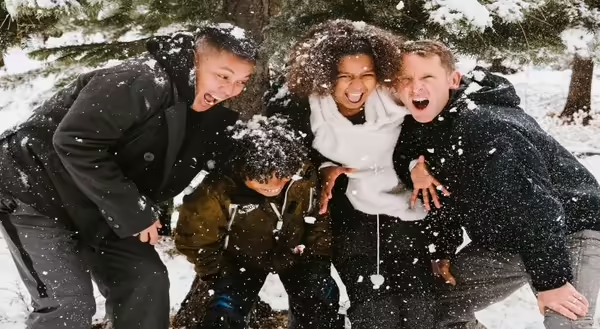
Every year the adults in my family have a Christmas gift exchange. Around October we draw names with wish lists to prepare for the exchange. A couple of years ago my brother wanted to change it up a little, and suggested we give experiences rather than actual items. We had so much fun that year! Painting and pottery classes, massages and spa treatments, target shooting, bowling and even horseback riding sessions were just a few of the fun experiences that were gifted. We agreed that doing things was much more fun that accumulating more stuff – and was much more meaningful. The same can be said for a child during the holidays. Do they need more stuff to make good memories? Will they even remember what they received years later?
The Illinois Early Learning Project (IELP) has a great tip sheet on making the holidays memorable and meaningful for children. Whether you are celebrating Hanukkah, Christmas, or Kwanzaa, the holidays can be busy and stressful. But we all want holidays to mean more to our children than receiving lots of gifts. IELP shares these ways to focus on the meaning of every holiday season:
- Strengthen family ties - Plan times to be together as a family. Choose a game night, a pizza and movie night, or a night for reading stories aloud. Avoid filling your calendar with lots of activities that pull parents and children in different directions.
- Encourage gifts from the heart - Help children think about the needs of others. Visit an elderly friend or relative who is alone, make cookies for a neighbor, or bring gifts to a women’s shelter. Volunteer at an organization that works with people in your community who have limited resources. (Note: Choose a volunteer activity that is appropriate for young children.)
- Create a peaceful home atmosphere - Reduce the noise and clatter of the season. Plan calm family activities such as family dinners, evening tea times, or story reading. Reduce noise and distractions by turning off the television, electronic games, and phone apps.
- Remember family rituals or traditions - Take part in-or start-some traditions that all family members can enjoy. Make holiday cookies or homemade greeting cards, sing holiday songs or play music, re-read favorite storybooks out loud, start a scrapbook or family diary, or light special candles at dinner or bedtime.
- Resist buying more - Advertisers hope to convince you that a perfect family holiday means buying more and to convince children that more gifts will make them happier! Limit children’s exposure to commercials, and help them learn to question advertisers’ claims. When possible, avoid taking preschoolers shopping during the holidays.
- Focus on people, not things - A good rule of thumb during the holiday season is to spend half the usual amount of money but twice the usual amount of time with your children. Make people, not things, your priority. Focus on activities that bring your family together and that draw children’s attention to the needs of others. These efforts will help reduce the madness and enhance the memories and meanings of the holidays.
Source: Illinois Early Learning Project.